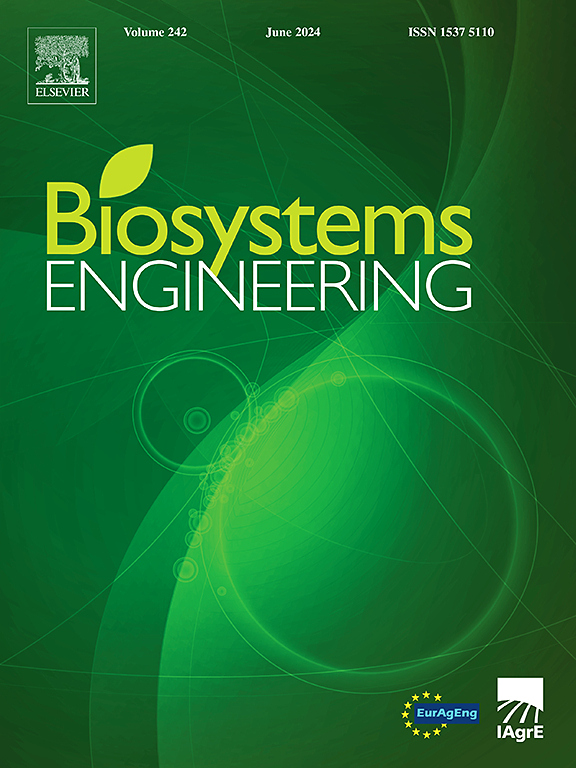Enhancing the anti-clogging performance of emitters in drip irrigation systems based on Bacillus subtilis strain DSM 10 and controlled replacement cycles
IF 4.4
1区 农林科学
Q1 AGRICULTURAL ENGINEERING
引用次数: 0
Abstract
Drip irrigation with slightly saline water is increasingly receiving attention in areas facing water scarcity worldwide. However, the high salt content can easily cause chemical clogging of emitters within the drip irrigation system. Resolving the clogging issue of emitters in drip irrigation systems using slightly saline water is essential for achieving the widespread adoption of such systems. This study involves the addition of Bacillus subtilis strain DSM 10 to the slightly saline water drip irrigation system, employing five different microbial agent replacement cycles (3d, 5d, 10d, 15d, and 20d), as well as a control group without microbial agents (CK). The study examined the effects of microbial agents on changes in water quality, alterations in the content of clogging substances, and the extent of clogging in emitters within the slightly saline water drip irrigation system. The results demonstrated that compared with the CK treatment, the addition of B. subtilis strain DSM 10 microbial inoculum with a longer replacement cycles (20 days) led to a significant reduction in the pH and EC of slightly saline water, and a significant enhancement in the solubility of the chemical clogging substances. The dry weight of clogging was reduced by 56.87%, with a 6.90% decrease specifically in CaCO3, resulting in a substantial improvement in the anti-clogging performance of the slightly saline water drip irrigation system by 57.27%. In general, the application of B. subtilis strain DSM 10 represents a biotechnological approach to enhancing the anti-clogging performance of slightly saline water drip irrigation systems.
基于枯草芽孢杆菌菌株DSM 10和控制更换周期提高滴灌系统中滴灌器的抗堵塞性能
在世界范围内面临水资源短缺的地区,微盐水滴灌越来越受到重视。然而,高含盐量很容易造成滴灌系统内喷口的化学堵塞。解决使用微盐水的滴灌系统中排放器的堵塞问题对于实现这种系统的广泛采用至关重要。本研究将枯草芽孢杆菌菌株DSM 10添加到微盐水滴灌系统中,采用5种不同的微生物剂更换周期(3d、5d、10d、15d和20d),以及不使用微生物剂的对照组(CK)。这项研究检查了微生物剂对水质变化的影响,堵塞物质含量的变化,以及微盐水滴灌系统内排放器堵塞的程度。结果表明,与CK处理相比,添加较长更换周期(20 d)的枯草芽孢杆菌菌株DSM 10微生物接种物可显著降低微盐水的pH和EC,显著提高化学堵塞物质的溶解度。堵塞干重降低了56.87%,其中CaCO3降低了6.90%,微盐水滴灌系统的抗堵塞性能显著提高了57.27%。总的来说,枯草芽孢杆菌菌株DSM 10的应用代表了一种提高微盐水滴灌系统抗堵塞性能的生物技术方法。
本文章由计算机程序翻译,如有差异,请以英文原文为准。
求助全文
约1分钟内获得全文
求助全文
来源期刊

Biosystems Engineering
农林科学-农业工程
CiteScore
10.60
自引率
7.80%
发文量
239
审稿时长
53 days
期刊介绍:
Biosystems Engineering publishes research in engineering and the physical sciences that represent advances in understanding or modelling of the performance of biological systems for sustainable developments in land use and the environment, agriculture and amenity, bioproduction processes and the food chain. The subject matter of the journal reflects the wide range and interdisciplinary nature of research in engineering for biological systems.
 求助内容:
求助内容: 应助结果提醒方式:
应助结果提醒方式:


